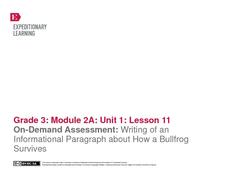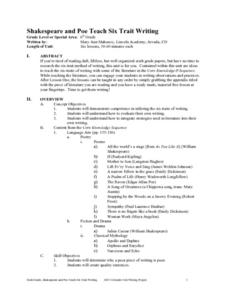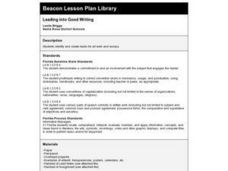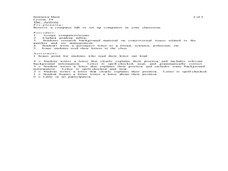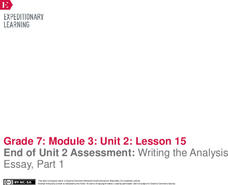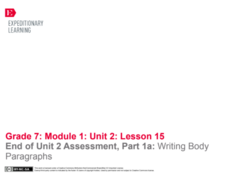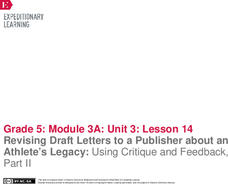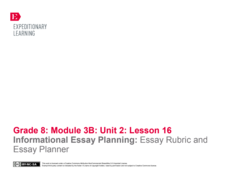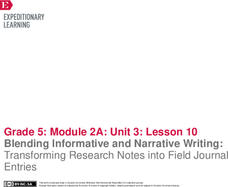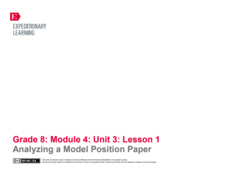EngageNY
On-Demand Assessment: Writing of an Information Paragraph About How a Bullfrog Survives
Having read and discussed Bullfrog at Magnolia Circle, third graders demonstrate their bullfrog expertise by writing informational paragraphs. Building on the note-taking and paragraph planning from the previous lesson plan,...
Curated OER
Shakespeare and Poe Teach Six-Trait Writing
A Six-Trait Writing instructional activity helps your middle schoolers liven up their word choice and shows them how to evaluate their own writing. Class members take a close look at the language used in poems by Shakespeare, Kipling,...
Curated OER
Leading into Good Writing
Discuss the importance of a lead in writing with your upper graders. They examine several examples of leads from literature and practice writing leads for pieces of artwork. They then select a topic from a list and write an introductory...
Curated OER
My View's Write!
After researching issues involving panthers, middle schoolers practice writing persuasive letters. They become familiar with a controversial issue related to panthers and write their position on the issue. This lesson...
EngageNY
End of Unit Assessment, Part 1, Continued: Revising Vocabulary and Conventions based on Feedback
Howdy, partner! Scholars partner up to look at the last two rows in the writing rubric. After discussing the details in the rubric about organization and conventions, learners use colored writing tools to circle feedback in their...
EngageNY
Scaffolding for Essay: Examining a Model and Introducing the NYS Grade 6–8 Expository Writing Evaluation Rubric
Write it down. Scholars take a close look at essay writing by examining the New York state writing rubric. They then discuss a model essay and compare the model essay to the What Makes a Literary Analysis Essay Effective? Anchor...
EngageNY
End of Unit 3 Assessment: Writing a Research Synthesis
Ready, set, write! Scholars work on the end-of-unit assessment by completing a writing prompt. They then look at the model performance task from instructional activity two to create a rubric for scoring the exercise. Using turn and talk,...
Curated OER
Writing Pattern Books
Have your older learners assist young children with writing in this community service and literacy lesson. Middle schoolers become partners with a local elementary school. They assist the grade school children in writing a pattern book...
EngageNY
End of Unit Assessment: Writing Best First Draft of “Back Again” Poem
Team up! Scholars begin working with their research teams to review the components of an effective poem. They then move on to independent work by beginning the end-of-unit assessment. Writers complete the draft of their "Back Again"...
EngageNY
End of Unit 2 Assessment: Writing the Analysis Essay, Part 1
1,2,3,4 score! Writers use the grading rubric to score the model essay. After comparing and discussing their scorings, the individuals begin the end-of-unit assessment.
EngageNY
Writing an Argumentative Essay: Analyzing the Model Essay
Models and exemplars help pupils learn. Scholars read a model argumentative essay to prepare for an upcoming writing assignment. As they read, they work with partners to complete a worksheet analyzing the essay's structure.
ReadWriteThink
Dear Librarian: Writing a Persuasive Letter
Everyone deserves to read a great book! Here, pupils write a persuasive letter to the school's librarian detailing their favorite story and why it should be found on the shelves. Class members' persuasive reading passages are shared with...
Curated OER
What's My Point: Persuasive Writing
Why do readers need to know an author’s purpose? How do you figure out what that purpose is? Guide your pupils through a series of activities that show them how to identify various techniques and structures used in persuasive writing....
Teach with Movies
Teaching Students to Write a Narrative
Encourage narrative writing with a clever exercise. Class members watch episodes from movies and describe what happened to a character, including details about the setting, plot, and characters. Writers then craft a narrative about a...
ReadWriteThink
Persuasive Essay: Environmental Issues
Young environmentalists learn how to craft a persuasive essay about an environmental issue they consider important. After studying the components of a persuasive essay and examining a student model, writers brainstorm possible topics and...
EngageNY
End of Unit 2 Assessment, Part 1a: Writing Body Paragraphs
It is not what you say but how you say it. Class members prepare for writing their A Long Walk to Water essays by analyzing row four in the writing rubric. Learners discuss the words used and talk about the importance of correct grammar...
EngageNY
Writing to Inform: Analyzing a Model Using a Rubric
Learn to write right. Scholars analyze the model essay Adversity Faced by Townspeople in the Middle Ages. They discuss the essay and make annotations working with an elbow partner. Learners then take another look at the essay using a...
EngageNY
Revising Draft Letters to a Publisher about an Athlete’s Legacy: Using Critique and Feedback, Part II
Let's get opinionated. Scholars participate in a peer critique and revision process using a fun activity called a Four Corners strategy. After incorporating classmates' feedback, individuals share their final drafts of their opinion...
EngageNY
Revising Draft Letters to a Publisher about an Athlete’s Legacy: Critique and Feedback, Part I
Pick a corner, any corner! Pupils use the Four Corners strategy and Peer Critique protocol to assess one another's draft letters to a publisher about an athlete's legacy. Scholars then use peer feedback to revise their letters.
Curated OER
Telling Our Stories of Giving - Writing to Persuade
After identifying the parts of a persuasive piece of writing, young writers explore different prewriting activities for the persuasive essay. They have the option to write a news article, personal narrative, or persuasive essay to...
EngageNY
Informational Essay Planning: Essay Rubric and Essay Planner
Class members dig into the expectations for the end-of-unit assessment for A Mighty Long Way by studying the rubric. The Rubric Criteria strips help pairs of readers look more closely at specific rubric points. They share ideas with the...
EngageNY
Blending Informative and Narrative Writing: Transforming Research Notes into Field Journal Entries
The fabulous four. Scholars learn the four key components for creating an excellent journal entry. They then work to create a journal entry rubric and participate in a mini lesson about organizing and outlining journal entries.
EngageNY
End of Unit Assessment, Part 1, Continued: Revising Vocabulary and Conventions Based on Feedback
Writers align their position papers with the last two rows in the rubric. After looking at the rubric rows for vocabulary and conventions along with feedback on their papers, class members revise their essays. They then look at the...
EngageNY
Analyzing a Model Position Paper
What's the difference between a position speech and a position paper? Scholars use a rubric to analyze a model essay about Michael Pollan's food chains to understand what makes them unique. Additionally, pupils create anchor charts...
Other popular searches
- Persuasive Writing Rubrics
- Expository Writing Rubrics
- Recipe Writing Rubrics
- Nonfiction Writing Rubrics
- Narrative Writing Rubrics
- Rubrics and Writing
- 6 Trait Writing Rubrics
- Song Writing Rubrics
- Rubrics for Writing
- Rubrics on Song Writing
- Grade 1 Writing Rubrics
- Rubrics for Poem Writing
